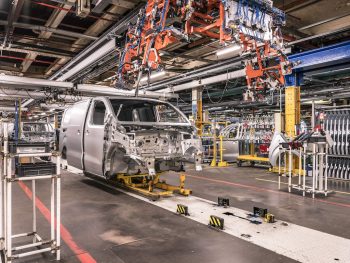UK commercial vehicle production grew 26.5% in the fifth month of 2022, recording its best May performance since 2012.

New figures from the Society of Motor Manufacturers and Traders (SMMT) show a total of 7,900 new vans, buses, trucks, coaches and taxis left British factory lines last month – marking the fifth consecutive month of growth.
The rise was driven by exports, which rose 91.6%, partly due to greater demand following the end of many lockdown measures abroad. Almost seven in 10 (67.9%) British-built CVs were exported in the month, with some 91.8% of these destined for the EU. But production for the UK fell 26.3% against significant economic headwinds.
Year-to-date, CV production is up 44.0% on last year, at 41,047 units, and some 29.1% up on the same period in 2019, making for the best January-to-May performance since 2012. It’s seen as evidence of robust demand from fleet operators and the capacity of CV manufacturers to deliver for the market despite significant global supply constraints and domestic economic challenges.
But – as with the car sector – the SMMT said the van side needs action to safeguard the global competitiveness of UK production, particularly around energy costs. It’s also called for the smooth and timely implementation of a new GB Type Approval system that does not hinder global competitiveness.
Mike Hawes, chief executive, explained: “The CV sector is a rare beacon amid the gloom of economic challenges being faced by businesses and fleet operators in the UK.
“With the best year to May output for a decade, and a growing number of zero-emission commercial vehicle models for a wider range of use cases, there are grounds for optimism.
“However, competitiveness is not guaranteed as rising energy costs and inflation continue to have a detrimental impact on manufacturers and markets. These issues must be tackled head-on to enable investment in innovation and training that will drive the CV sector’s transition to net zero, futureproofing jobs and livelihoods for years to come.”

